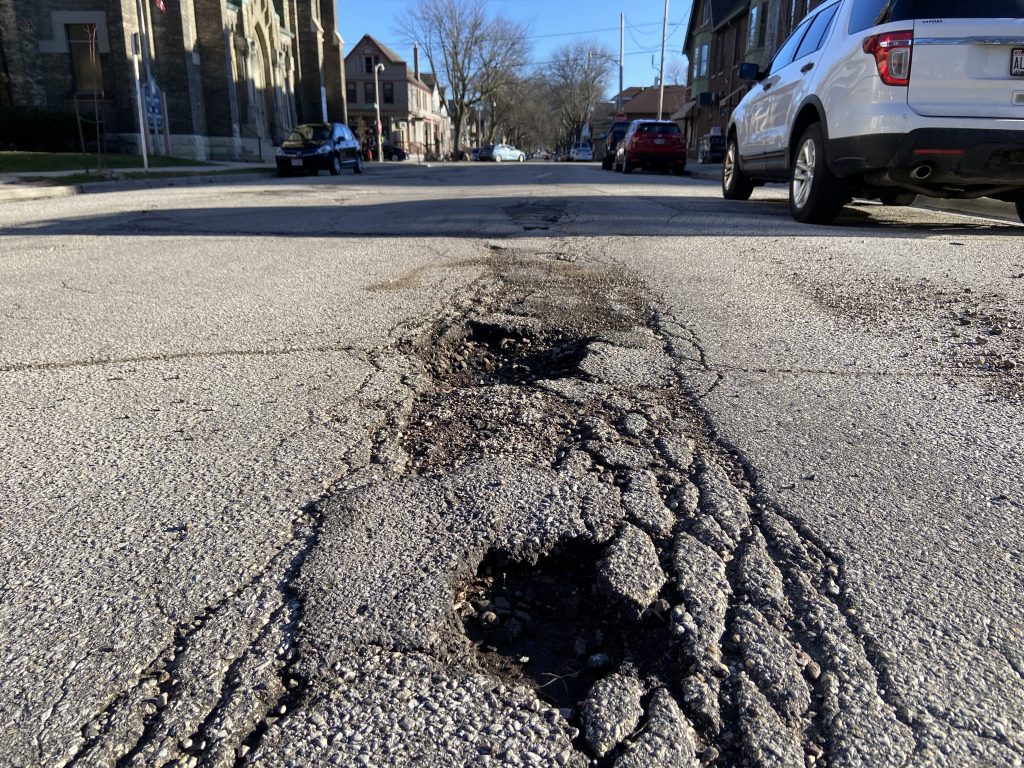Wisconsin Is Experiencing a Surge in Wheel Taxes
Without other options, local governments increasingly turn to the option for funding.

Damaged road on N. Bremen Street. Photo by Graham Kilmer.
Rumblings about a wheel tax increase were heard during the recent Milwaukee County budget process. The Milwaukee Common Council also adopted an $11 increase in its wheel tax during its budget process. The City of Cudahy is currently debating implementing the largest wheel tax in the state.
The wheel tax, formally a vehicle registration fee, is one of the very few options local governments have to raise revenue when faced with budget deficits. Local governments across the state are increasingly turning to the option after more than a decade of stagnant state aid and restrictions on property tax increases, according to a new report by the Wisconsin Policy Forum.
Paid by vehicle owners to the Wisconsin Department of Transportation, the revenue is shared with local governments and, under state law, must be spent on transportation-related expenses, such as roads or public transit.
Wheel taxes are relatively new for most Wisconsin taxpayers, though state law first made the option available in 1967. By 2010, only four local governments had a wheel tax. Milwaukee County did not adopt its first wheel tax until 2016. But by 2019, 43% of state residents lived in a community with a wheel tax. Between 2015 and 2021, the state saw “rapid growth” in communities enacting wheel taxes, according to the WPF report.
The growth started during the tenure of former Wisconsin Gov. Scott Walker, who faced criticism for failing to adequately fund road repair and construction. Gov. Tony Evers defeated Walker in 2018, campaigning on road maintenance, which proved a salient issue for Wisconsin voters. Potholes during this period were sometimes pejoratively referred to as “Scott holes” and Evers made “fix the damn roads” a campaign slogan.
Under Walker, the state enacted stricter limits on property tax increases and did not raise state aid to keep pace with inflation. More local governments have turned to the wheel tax as one of the few options to narrow their budget gaps. But problems with the state’s transportation funding model predate Walker, too. The road funding system has been highly vulnerable to inflation since the state stopped indexing the gas tax to inflation in 2005, according to the WPF report.
Wheel tax revenues and new wheel taxes continue ticking up. Across the state, five new wheel taxes were adopted for 2026. Beginning next year, 68 communities — including 14 counties, 37 cities, 15 villages and two towns — will have wheel taxes. Each community institutes its own fee. At the high end will soon be the City of Milwaukee with a $41 fee, though several cities have a $40 fee, and at the low end are a collection of cities with a $10 fee.
Milwaukee County’s wheel tax is $30. In 2026, for the first time, 100% of the wheel tax revenue will be allocated to the Milwaukee County Transit System (MCTS). The system faces an approximately $9 million budget deficit following the recent adoption of the county budget. MCTS is working on a plan for service cuts that is anticipated to be released in December. In the face of massive cuts to transit, county supervisors will consider raising the wheel tax next year to prevent further cuts.
The wheel tax is only one signal of a growing budget crisis for local governments across the state. An increasing number of local governments, including governments in conservative communities, are going to public referenda for property tax increases.
WPF’s report notes that the wheel tax is a poor tool for addressing the local government budget crisis, as unless the fee is raised annually, inflation erodes the value of the revenue generated. When adjusted for inflation, the revenue collected through the wheel tax in Milwaukee has actually gone down by $1 million.
Faced with rising wheel taxes, state legislators are starting to exhibit what WPF calls “wheel tax fatigue.” Some state lawmakers have introduced a bill to require a voter referendum to enact a wheel tax.
In 2023, the state Legislature passed Act 12, which provided the city and county with new sales tax authority. It also modified the state’s shared revenue formula, boosting aid for local governments across the state. But it wasn’t enough to close the budget gaps, driving communities to the wheel tax. Without further action at the state level, more communities will face a choice between greater reliance on the wheel tax or cuts to road maintenance and public transit, which Milwaukee is already contending with.
Legislation Link - Urban Milwaukee members see direct links to legislation mentioned in this article. Join today
If you think stories like this are important, become a member of Urban Milwaukee and help support real, independent journalism. Plus you get some cool added benefits.
Transportation
-
Congestion Pricing Cuts Air Pollution in New York City
 Dec 14th, 2025 by Jeff Wood
Dec 14th, 2025 by Jeff Wood
-
FTA Tells Milwaukee to Crack Down on Fare Evasion — Even Where Fares Don’t Exist
 Dec 12th, 2025 by Graham Kilmer
Dec 12th, 2025 by Graham Kilmer
-
Will GOGO’s Bus Service Ever Get Going?
 Dec 9th, 2025 by Jeramey Jannene
Dec 9th, 2025 by Jeramey Jannene






















Cudahy discarded its proposed $50 wheel tax after city residents packed the city hall chambers in opposition. However, other miscellaneous fees are still under consideration. The republican controlled legislature have placed these municipalities in an unsustainable situation.